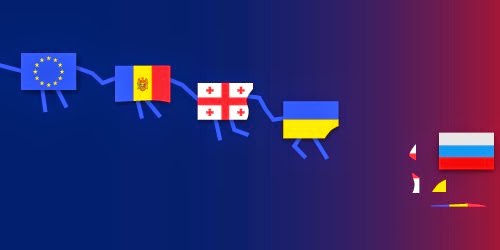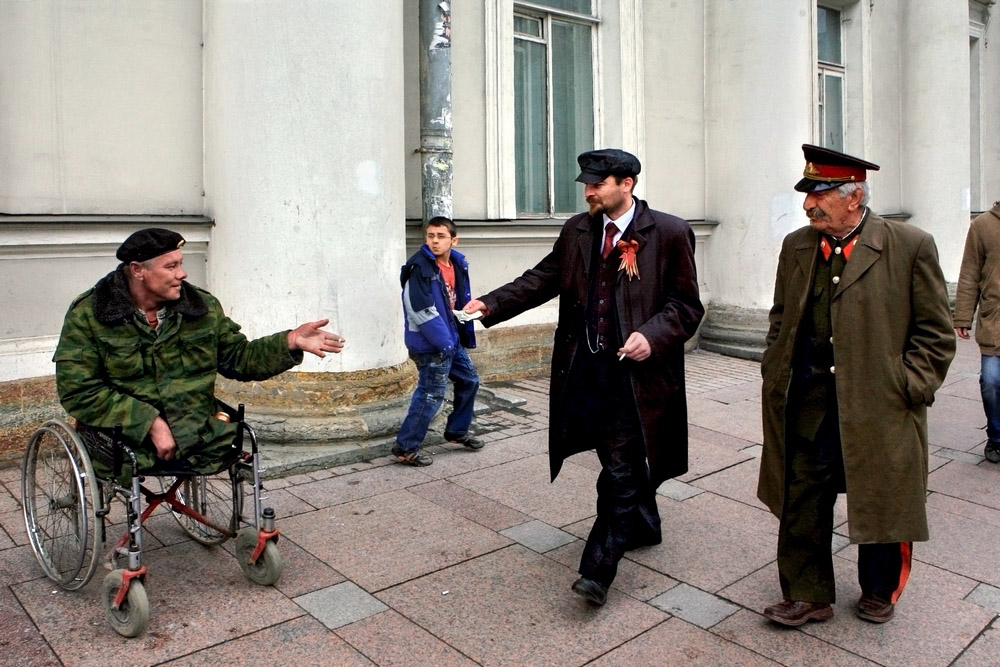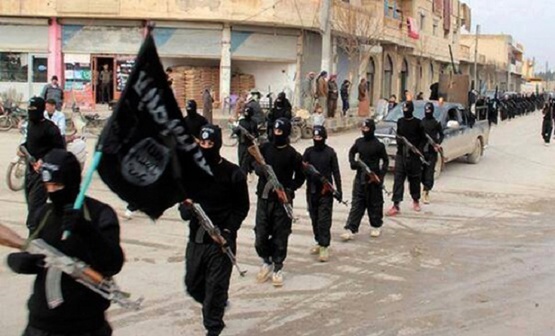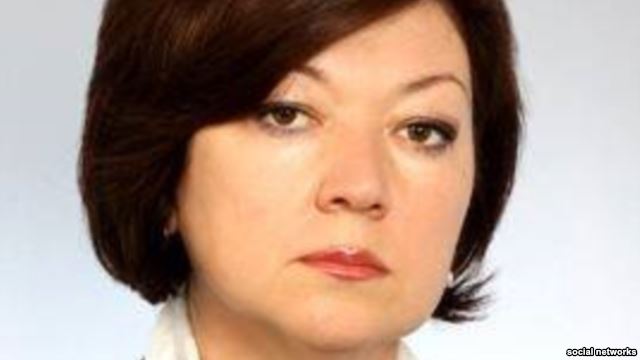While Moldova and Ukraine have a long history of common ties, recent relations have relied strongly on a shared desire for EU integration.
The change in government in 2014 in Ukraine led to the possibility for even stronger connections between the two countries. While relations were hampered in 2014-2015 by the fact that the position of Ukrainian ambassador to Ukraine was left vacant, 2016 saw even closer relations between the two countries. Prime Minister of Moldova Iurie Leancă’s visit to Kyiv to meet with then-Premier Yatseniuk in March, 2014 was a clear sign that Moldova was looking forward to having Ukraine as a pro-democratic neighbor. This came at the same time as Ukraine was faced with the problem of Russian territorial aggression in Crimea. President Poroshenko’s own visit to Chisinau in November of the same year served as a reciprocal gesture of support for Moldova from Ukraine’s side.
These ceremonial gestures were a good start to renewed relations with Moldova at a time when there are many mutual issues to be solved.
This can only be solved when the matter of the Dniester HES-2 hydroelectric station, which was built without Moldovan participation on territory first given to Ukraine by the USSR and then later invalidated as Ukrainian territory, is solved.
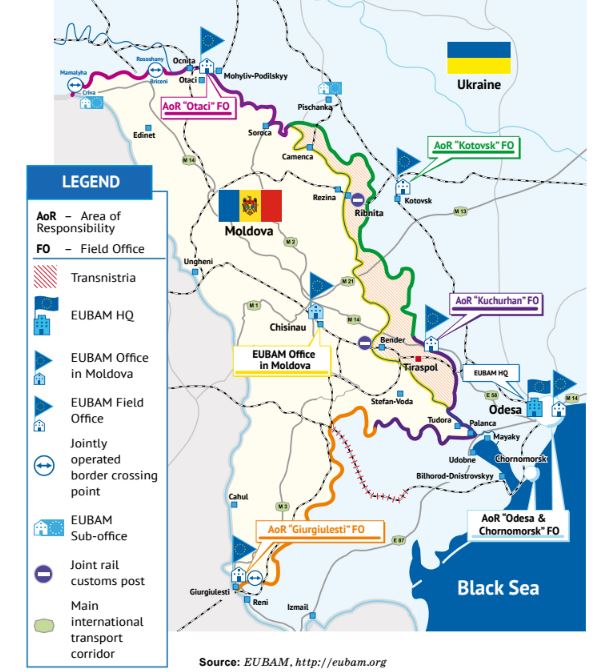
Ukraine has tried to clamp down on these problems by regulating border control with the support of the National Guard along the Transnistrian side of the border. Passport control also became stricter, especially focusing on Russian citizens attempting to cross the border. Under the EU Border Assistance Mission to Moldova and Ukraine (EUBAM), Moldovan and Ukrainian border controls have made progress in combating human trafficking and illegal trade while simultaneously integrating customs officials from both countries into the EU’s law enforcement and customs systems.
Concerning legal trade, Ukraine and Moldova have agreed to liberalize air traffic while also canceling permits for transit of cargo trucks between Ukraine and Moldova. Talks in 2015 concerning the resumption of trains between Ukraine’s Bereyno and Moldova’s Basarabeasca could lead to further transport of Moldovan cargo to Odesa ports. The construction of a highway from Poland to Romania via Ukraine and Moldova could also have a large impact on the level of tourism between both countries and potentially stimulate economic growth.
This, plus the possibility of extending the EU’s common market to the Association Agreement states as suggested by Minister of Foreign Affairs of Ukraine Pavlo Klimkin would spark economic growth. It would also be accompanied by enhanced ties between the countries in the spheres of trade and tourism, plus integrating energy networks and encouraging youth and student exchange.
However, it is important to mention the difficulty that Moldovan wine producers have had in gaining access to the Ukrainian market, given the favor shown to Ukrainian domestic producers. This last point should be considered by Ukrainian authorities who are at risk of worsening the situation around the Russian embargo of Moldovan wines. This embargo considerably weakened the Moldovan economy and made the resumption of positive relations with Russia especially enticing. Given Moscow’s statements concerning future custom’s clearance for Moldova wine in the Krasnodar region, meaning overseas transit that would not benefit the Ukrainian economy at all, it is especially important that Ukraine try and create positive conditions for Moldovan economic growth independent of Moscow.
A matter of concern for Ukraine is its loss of position in Moldova’s energy market. the Moldovan mass media portrayed this as a result of Ukrainian companies being ousted by Russian Inter RAO even after the former offered better conditions and prices. Contracts were ultimately signed with Energokapital, a Transistrian company, leading experts to believe that the Moldovan authorities turned down the Ukrainian offer in order to save the Transnistrian budget and maintain their vested interests in this scheme.
Moldova also continues to be dependent on Russian gas, a matter furthermore compounded by the fact that Tiraspol has used gas supplied through Molodovgaz company to create electricity. This gas is not paid for, leaving over 5 billion USD of debt to Gazprom at Chisinau’s door, 88% of which Chisinau attributes to Tiraspol.
Given that the Dniester supplies 70% of Chisinau’s water resources (including drinking water), water level and quality, plus the river’s ecosystem overall are on the agenda. Unfortunately, there are many on the Moldovan side who consider that Ukraine is to blame for water pollution and the low water level of the Dniester, and that the Ukrainian side overall has no desire to sit down and talk about these issues.
Unfortunately, despite international commitments concerning ecological preservation, Ukraine has recently approved a state plan to build six additional dams along the Dniester by 2016. In approving the plan, Ukraine’s increased energy efficiency was cited as the most important concern. However, according to the Ministry of Ecology and Natural Resources of Ukraine,
“if this construction is undertaken, all natural complexes in and along the Dniester’s riverbed in the Dniester Canyon National Nature Preservation Park, part of the natural complexes in the Khotynsky and Halytsky National Parks, and a number of objects in the natural reserves of other categories will be destroyed.”
In addition, the construction of these dams would lead to Ukraine’s violation of agreements it signed, namely the Agreement between the Cabinet of Ministers of Ukraine and the Government of Moldova on Cooperation in the Protection and Sustainable Development of the Dniester River Basin (signed in 2012 in Rome, ratified by Moldova, and prepared for ratification by Ukraine).
Additional problems in this sphere include the low water level in the Dniester water reservoir as a result of global climate change and the Ukrainian hydroelectric dam Dniester HES-1. Interparliamentary cooperation and relying on international experience are two tools to fix these problems, which first requires a less hostile and more open dialogue on these matters. Thankfully, cooperation has been mediated by the OSCE and the UN Economic Commission for Europe, and the Global Environment Facility gave almost 2 million USD for a Moldovan-Ukrainian project “Enabling transboundary cooperation and integrated water resources management in the Dniester River basin.” Therefore multilateral cooperation is a major avenue for Ukraine and Moldova in guiding further talks on these matters.
Unfortunately, Ukrainian efforts to access the diaspora community, which comprises over 8% of Moldova’s population, have focused on the populations in Chisinau, Transnistria, and northern Moldova. However, much of this population is scattered in other places in Moldova.
It is also crucial to note the influence that Russian propaganda has had on the Ukrainian population in Transnistria. With Ukrainian language under threat from 25 years of living apart from Ukraine, the Ukrainian diaspora is reliant on Russian-language schools for their education on Ukrainian literature and language.
Recently, Tiraspol started to censor textbooks received from Ukraine, disagreeing with their content. Moreover, these schools are fading in importance, since most Moldovans see Romanian-language schools as more important for their children’s future. The majority of Ukrainians in Moldova able to vote in the 2014 elections who actually did so was negligible, but polls showed that the majority of Ukrainians in Moldova disapproved of Maidan and approved of the annexation of Crimea by Russia.
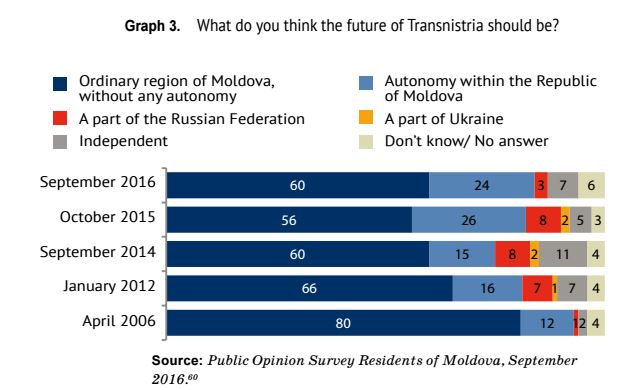
Concerning the Moldovan diaspora community in Ukraine, there is the issue of pro-Romanian and pro-Moldovan sentiment, which essentially divides the community in two. Romania’s soft power influence has made the pro-Romanian cause more attractive, but Moldova’s relatively recent visa-free regime with the EU has counteracted that to some extent. In any case, Ukraine should focus on remaining a neutral presence that encourages dialogue for both sides. Without trying to assimilate either community, Ukraine should attempt to counter Russian propaganda by printing works in minority languages and trying to integrate them into Ukrainian social and political life.
While the Ukrainian government prior to this had avoided the topic, the new government in Kyiv tried to be more proactive in ending the conflict. The Ukrainian authorities adopted a decision which led to Chișinău’s increased control over Tiraspol and denounced Ukraine’s earlier agreement with the Russian Federation concerning the passage of Russian military personnel and equipment to Transnistria, effectively making it impossible for Russian troops to relieve the peacekeeping forces in Transnistria. Ukrainian airspace also became closed to private jets belonging to Russian politicians.
Ukraine’s own territorial conflicts in Crimea and the east joined with the withdrawal of Russian troops from Transnistria as part of President Poroshenko’s agenda. However, the Ukrainian government should be careful to make sure that the “red lines” for all three issues stay consistent with each other in order to combat Russian policy consistent for all three territories. The government should also concentrate the agenda of reintegrating Transnistria into Moldova and parts of Donetsk and Luhansk oblasts and the Crimea into Ukraine in one office. This office will enhance coordination, international cooperation, and the development of a political strategy for effective implementation of the necessary decisions.
Kyiv does not want to be alone in negotiations with Russia concerning Donbas, while it is also in Ukraine’s best interests to make sure that there is no Russian-backed force on its Western borders. Ukraine should also work with Moldova to fight the spread of Russian misinformation in Moldova.
Related: Bulgaria, Moldova elect pro-Russian presidents
[hr]This report was conducted within the project of the Institute of World Policy “Ukraine’s Foreign Policy Audit.” This project is implemented with the support of the Black Sea Trust for Regional Cooperation of German Marshall Fund (GMF).
The contents are those of the Institute of World Policy (IWP) and do not necessarily reflect the views of the German Marshall Fund (GMF).
- Other materials from this series:
- How the Ukrainian-Polish partnership can pass the test of history
- Foreign Policy Audit. Ukraine and Georgia are friends, but no longer allies
- Ukraine and Romania – friendship through a common enemy?
- Foreign Policy Audit. How to revive Ukrainian-Chinese relations
- Austria: a weak link in Europe or historical ally of Ukraine?




